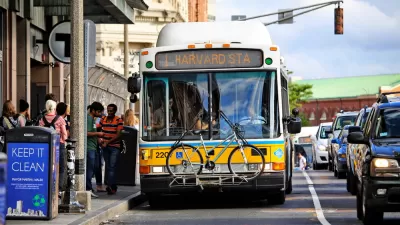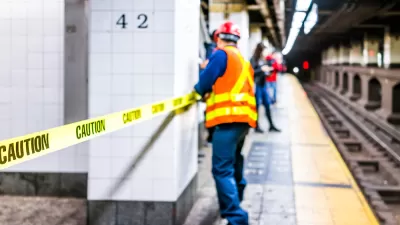Boston is considering regulatory changes that would extend the hours of late night services like alcohol sales and transit. An editorial in the Boston Globe recommends a data-driven approach for deciding where to implement the nightlife experiment.
"The MBTA is once again testing out late-night service, Boston is piloting late-night food trucks, and Mayor Walsh’s Late Night Task Force is designing a trial program to allow some bars and restaurants to stay open after 2 a.m.," writes Edward Glaeser for the Boston Globe. The tricky question, however, is "[where] should all this activity in the wee hours be allowed?"
Instead of locating the experiment in a single neighborhood and increasing the likeliness of alco-commuting, Glaeser recommends a data-driven approach to deciding where to allow new late night activity, even citing some examples of data sets that could help determine the first locations for the city's experiment:
"With a proper treatment and control sample, the city would be able to measure the impact of later nights on crime and neighborhood disruptions. Local residents can be surveyed on the Web while the experiment is ongoing. The Police Department could step up spot checks of late-night drivers to see whether there is an increase in drunken driving. Heat maps of Twitter can measure if late-night areas see an upsurge in tech-savvy night owls."
FULL STORY: Better nightlife through experimentation

Maui's Vacation Rental Debate Turns Ugly
Verbal attacks, misinformation campaigns and fistfights plague a high-stakes debate to convert thousands of vacation rentals into long-term housing.

Planetizen Federal Action Tracker
A weekly monitor of how Trump’s orders and actions are impacting planners and planning in America.

In Urban Planning, AI Prompting Could be the New Design Thinking
Creativity has long been key to great urban design. What if we see AI as our new creative partner?

King County Supportive Housing Program Offers Hope for Unhoused Residents
The county is taking a ‘Housing First’ approach that prioritizes getting people into housing, then offering wraparound supportive services.

Researchers Use AI to Get Clearer Picture of US Housing
Analysts are using artificial intelligence to supercharge their research by allowing them to comb through data faster. Though these AI tools can be error prone, they save time and housing researchers are optimistic about the future.

Making Shared Micromobility More Inclusive
Cities and shared mobility system operators can do more to include people with disabilities in planning and operations, per a new report.
Urban Design for Planners 1: Software Tools
This six-course series explores essential urban design concepts using open source software and equips planners with the tools they need to participate fully in the urban design process.
Planning for Universal Design
Learn the tools for implementing Universal Design in planning regulations.
planning NEXT
Appalachian Highlands Housing Partners
Mpact (founded as Rail~Volution)
City of Camden Redevelopment Agency
City of Astoria
City of Portland
City of Laramie




























